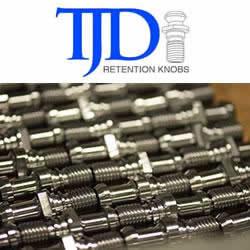Technology Training Corporation (TTC) Announces 'Additive Manufacturing for Defense and Government' July 13-14, 2017
Missions, Capabilities, Opportunities
WASHINGTON, May 24, 2017 /PRNewswire/ -- This carefully crafted technical symposium provides a forum for key government and industry experts who are shaping the future of additive manufacturing for defense and government to examine the latest DoD and government plans for spurring the growth of this dynamic technology. Questions and topics will include:
How are DoD and Service manufacturing strategies being shaped by additive manufacturing?
How is the state-of-the-science being pushed by NIST, DOE, NASA, NSF and other government efforts? What are the emerging lessons learned from early tactical deployments of 3D printing on the battlefield? Aboard ship?
What new materials and processes are needed? What are the potential cyber security challenges and solutions? What is 4D printing?
How will 4D printing enable future systems to evolve in response to immediate tactical stimuli? What are the latest 3D/4D printing and AM capabilities on the industry drawing board? How can you get involved?
These and many other critical questions will be examined during this Interactive General Session.
Our Distinguished Panel of DoD, Government, and Industry Additive Manufacturing Experts:
Captain Jason Bridges, USN, USN Director, Navy Business Operations and Total Ownership Cost Branch, Office of the Deputy Chief of Naval Operations for Fleet Readiness and Logistics (OPNAV N41)
Ms. Tracy Frost Director, DoD Manufacturing USA Institutes & Acting Director, DoD ManTech
Ms. Kelly Morris Chief, Logistics Research and Development, Defense Logistics Agency
Dr. Devanand Shenoy, Chief Engineer, Advanced Manufacturing Office, U.S. Department of Energy
Mr. John M. Ortiz Jr., Project Manager, Technology Readiness Assessment Guide Project, U.S. Government Accountability Office (GAO)
Dr. Jaimie Tiley, Program Officer, Air Force Office of Scientific Research (AFOSR/RTA)
Mr. James Zunino, Senior Materials Engineer, Materials, Mfg. & and Prototype Technology Division, Picatinny Arsenal, U.S. Army (ARDEC)
Dr. Edward Reutzel, Senior Research Associate, Center for Innovative Materials Processing (CIMP-3D), Dept. Head, Laser System Engineering & Integration, (ARL Penn State)
Ms. Kristin Morgan, Engineering Project Manager, NASA Marshall Space Flight Center
Ms. Bianca Lankford, Mechanical Engineer, Northrop Grumman Corporation
LtCol Howard Marotto, USMC LPV-3, NexLog, Additive Manufacturing and Innovation
Mr. Joe Schibi, Senior Consultant, Supply Chain Strategy, Deloitte Consulting LLP
Mr. Jared Blecher, Senior Metals Defense Engineer, 3D Systems
Mr. Bill Harris, Technical Fellow, Manufacturing Technology, Sikorsky Aircraft, a Lockheed Martin Company
Mr. Mark Vitale, Specialist Leader, Deloitte Consulting LLP Federal Practice
Mr. John Grubbs, Technical Program Manager, Rolls-Royce
Dr. Peter Liacouras, Director of Services, 3D Medical Applications Center, Department of Radiology, Walter Reed National Military Medical Center
Would you like to be an exhibitor at this symposium? Host a breakfast, lunch or beverage reception during the symposium? Please contact Ken Hood at 310-320-8110 or hoodk@ttcus.com to find out how your organization can participate.
Featured Product

T.J. Davies' Retention Knobs
Our retention knobs are manufactured above international standards or to machine builder specifications. Retention knobs are manufactured utilizing AMS-6274/AISI-8620 alloy steel drawn in the United States. Threads are single-pointed on our lathes while manufacturing all other retention knob features to ensure high concentricity. Our process ensures that our threads are balanced (lead in/lead out at 180 degrees.) Each retention knob is carburized (hardened) to 58-62HRC, and case depth is .020-.030. Core hardness 40HRC. Each retention knob is coated utilizing a hot black oxide coating to military specifications. Our retention knobs are 100% covered in black oxide to prevent rust. All retention knob surfaces (not just mating surfaces) have a precision finish of 32 RMA micro or better: ISO grade 6N. Each retention knob is magnetic particle tested and tested at 2.5 times the pulling force of the drawbar. Certifications are maintained for each step in the manufacturing process for traceability.
